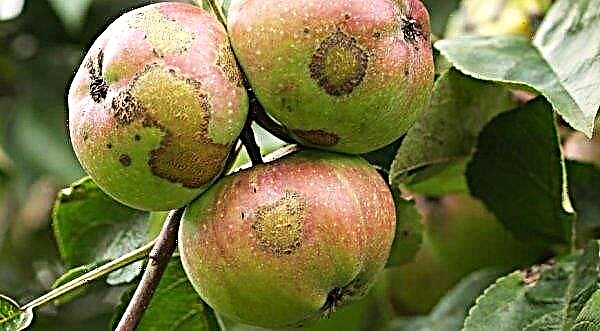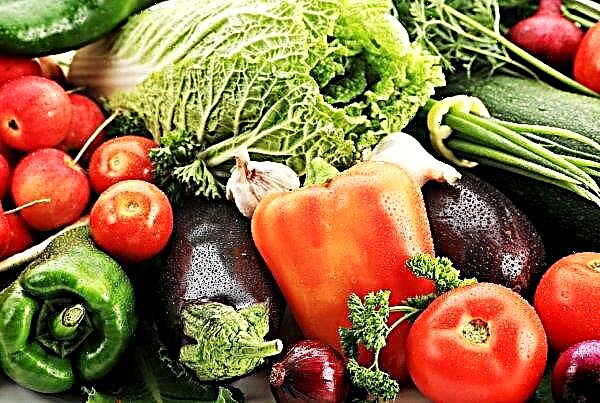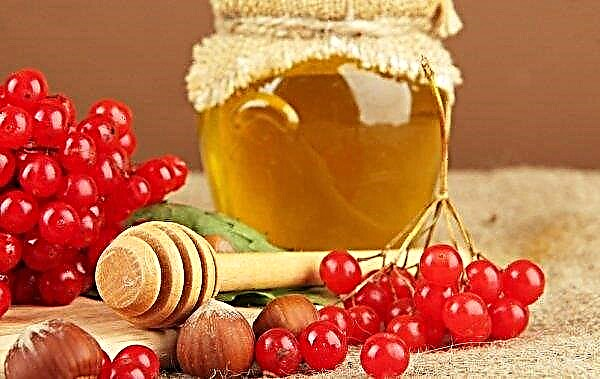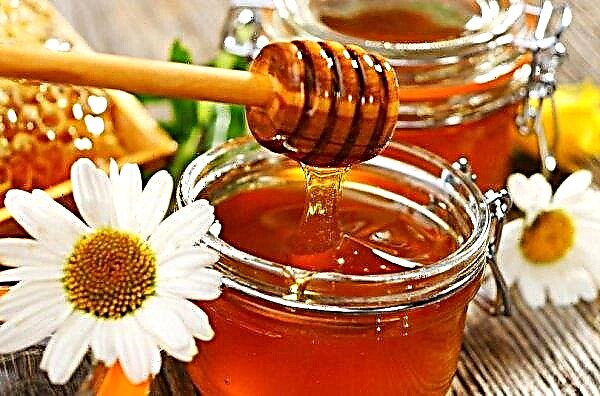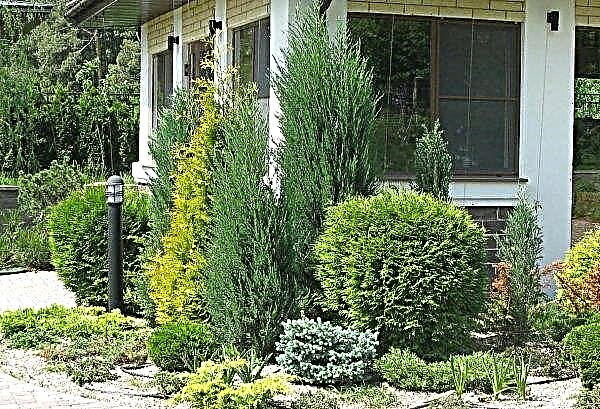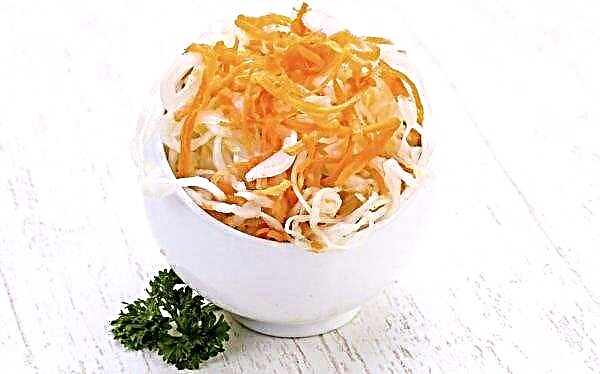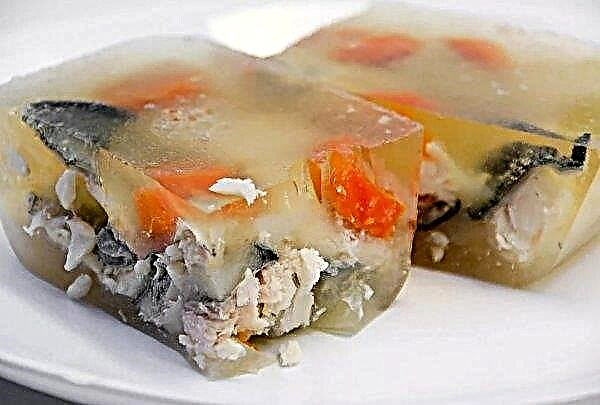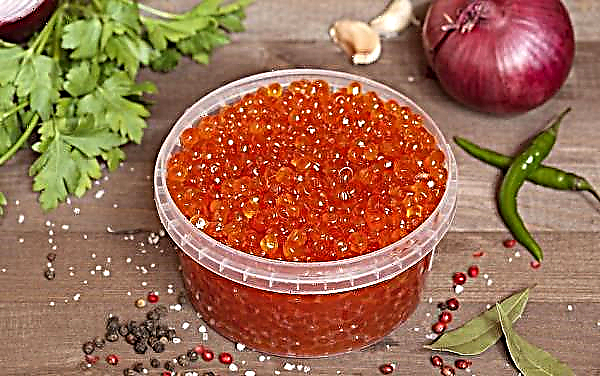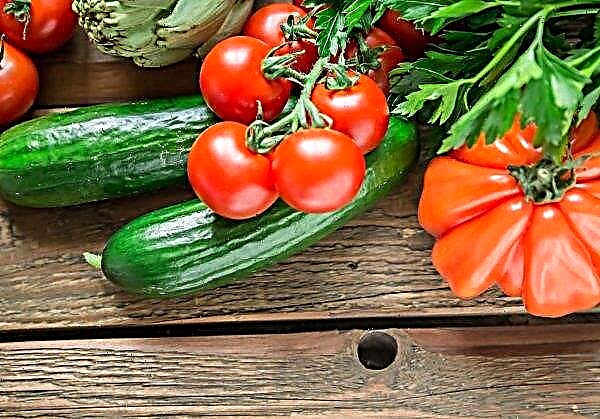Anise seeds have long been known as a spice. They have been used in baking since the times of the ancient civilizations of the Middle East. The healing properties of this spice were also observed: improved digestion, cured colds. About what other useful properties this plant has, and how to take it, read in this review.
What is anise and its seeds?
Anise is an annual herbaceous plant that belongs to the umbrella family. It is believed that they began to grow it in the Middle East because of the spicy aroma. Plant height - 50–70 cm.
Did you know? The builders of steam locomotives in the UK included capsules of anise oil in plain bearings so that a special smell could alert the driver in case of overheating.
The structure of the plant is the same as that of other representatives of the umbrella:
- root: rod, up to 20 cm long;
- stems: long straight;
- 3 types of leaves: basal, long-lower ones with a rounded leaf plate with incisions and middle two-lobed leaves.
 In June-July, umbrellas from small white flowers form on the plant. In late summer, fruits appear. These are ovoid grains of green-gray color.
In June-July, umbrellas from small white flowers form on the plant. In late summer, fruits appear. These are ovoid grains of green-gray color.The seeds have a characteristic shape: in the form of a comma, slightly elongated and curved. The length of the seed is 3-4 mm. Color is light brown. There are thin stripes on the outer surface. They have a sweet and aromatic smell reminiscent of licorice. The plant is grown for the sake of these fragrant seeds. Oil is obtained from them.
The root and leaves of the plant are much less commonly used. But they are also applicable in the manufacture of medicines that complement the traditional treatment with pills.
The chemical composition of anise seeds
The plant contains a number of important chemical compounds with antioxidant and antiseptic properties. They contribute to better health.
Nutritional composition of seeds:
| In 100 g of product | amount | % of the daily rate |
| Calories | 337 | 17 |
| Fats | 15.9 g | 79 |
| Squirrels | 17.6 g | 51 |
| Cellulose | 14.6 g | 38 |
| Carbohydrates | 50 g | 38 |
| Cholesterol | - | - |
A large number of B vitamins were found in the chemical composition of seeds, including riboflavin (B2), pyridoxine (B6), thiamine (B1), niacin (B3). They also have vitamins with antioxidant properties - these are vitamins C and A.
Vitamin composition of seeds:
| In 100 g of product | amount | % of the daily rate |
| A (beta carotene) | 311 mg | 10,5 |
| B1 (thiamine) | 0.34 mg | 28 |
| B2 (riboflavin) | 0.29 mg | 22 |
| B3 (niacin) | 3.6 mg | 19 |
| B5 (pantothenic acid) | 0.8 mg | 16 |
| B6 (pyridoxine) | 0.65 mg | 50 |
| B9 (folate) | 10 g | 2,5 |
| C (ascorbic acid) | 21 mg | 35 |
The plant also has a large complex of minerals needed by the body:
- Manganese - a mineral necessary for intracellular and intercellular metabolism, supporting reproductive functions. Its in anise - 100% of the daily norm.
- Copper - an element involved in hematopoiesis during the formation of red blood cells, supporting tissue respiration. Her in the composition of the seeds - 101%.
- But most of all in iron anise - 462%. Iron - An active participant in the processes of hematopoiesis, immunobiological reactions and redox processes.
 Quite a lot in the seeds of calcium, phosphorus, zinc
Quite a lot in the seeds of calcium, phosphorus, zinc
Mineral composition:
| In 100 g of product | Weight (in mg) | % of the daily rate |
| Iron | 36,96 | 462 |
| Copper | 0,9 | 101 |
| Manganese | 2,3 | 100 |
| Calcium | 646 | 65 |
| Phosphorus | 440 | 63 |
| Zinc | 5,3 | 48 |
| Magnesium | 170 | 42,5 |
| Potassium | 1441 | 31 |
| Selenium | 5 | 9 |
| Sodium | 16 | 1 |
Important! Chemicals contained in anise can act as insecticides.
The benefits and harms of anise
In anise you will find linalool - a compound of antioxidants that improve health in many ways. Its seeds are rich in anethole, which gives them a bright spicy aroma. Their therapeutic effect was noted by the Greeks. Used pharmacological forms: extracts, decoctions, oils, tinctures, decoctions, teas.
Used pharmacological forms: extracts, decoctions, oils, tinctures, decoctions, teas.
- The plant has the following beneficial properties:
- anticoagulant;
- painkillers;
- anti-inflammatory;
- antidiuretic;
- sweatshops;
- laxatives;
- antifungal;
- anti-inflammatory;
- antipyretic;
- antiseptic.
Anise is completely safe to eat. It is harmful only if there is an allergy to herbs.
Did you know? Essential oil extracted from anise seeds has anti-inflammatory properties. It can relieve pain and in this is similar to the action of 100 mg of aspirin or 10 mg of morphine. And this is great news for people suffering from diseases of the musculoskeletal system.
For children
Spice has a number of advantages that make it useful for a child. Anise tea can be given to a baby as early as 7 months, given its harmlessness and many useful qualities.
- The main advantages for a children's diet:
- Aniseed tea is considered a valuable treatment for sleep disorders. You can drink after meals and at bedtime. But do not cook aniseed seeds for longer than 2 minutes, so as not to evaporate the essential oil, otherwise the therapeutic effect will be lost.
- It is used to enhance lactation in nursing mothers, which affects the long-term feeding of the baby.
- The herb improves digestive functions and is considered an excellent remedy for solving digestive problems. Acts as an appetite stimulant.
- Seeds are considered an ideal expectorant. Contribute to sputum loss in the lungs and throat. They are an effective treatment for asthma.
- Anise is also effective in the treatment of cough and is useful in the treatment of other respiratory diseases such as bronchitis, flu, sinusitis and pneumonia.
- Anise oil is used in the treatment of various skin diseases.
- In addition, this oil is generally poisonous to insects and is therefore used to control lice.
- Essential oil has a narcotic and sedative effect at the same time. And this can help reduce the onset of epilepsy and hysteria in children.
- Helps maintain oral health. It is considered an antibacterial, antimicrobial agent.
- Provides instant removal of spots, acne and skin lesions. It helps her to be soft, smooth and radiant.
- Provides relief from toothache.
Did you know? In the 1860s, during the Civil War, American nurse Maureen Hellstrom first used aniseed seeds for disinfection. Later it was discovered that anise, despite its antiseptic properties, increased the toxicity of the blood of the wounded, and the use of the method was discontinued.
For adults
Anise is also good for adults.
- Its special health properties for men and women are as follows:
- Helps manage the menstrual cycle in women, and also contributes to healthy reproductive health. Aniseed tea is used in this capacity.
- Seeds can prevent or reduce thrombosis thanks to essential oils.
- It is considered an excellent tool for treating digestive tract diseases and improving metabolism.
- Helps in the restoration of damaged hair, promotes the growth of new ones. It treats dandruff and flakes, which are commonly found in people with dry scalp.
- Anise relieves hormonal problems in women, including reducing menstrual cramps and pain.
- Helps in eliminating stomach ailments.
- Metabolism in the body can be regulated using anise oil.
- Reduces pressure on the heart, helping it function well.
- It is a natural analgesic.
- The oil is extracted from star anise, which has strong antirheumatic properties. It helps stimulate blood circulation and has a calming effect on the affected areas, reducing pain and inflammation.
- Helps to cure conditions caused by cramps, cramps, pain, nervous disorders and diarrhea. It has a calming effect that helps relieve cramping.
Did you know? Aniseed seed also has aphrodisiac properties and can enhance libido. Drink one glass of broth every night to enhance sexual desire.
Medical use
Anise seeds and oils obtained from them are used in traditional medicines aimed at promoting health and preventing disease. The purpose of the drugs is the treatment of asthma, bronchitis.
Preparations with anise seed extract are also used to treat digestive disorders, including: colic, bloating, flatulence, nausea, and indigestion. A decoction obtained from seeds is prescribed to nursing mothers to stimulate the production of breast milk.
Aniseed water is very useful for relieving the common cold in children. To freshen the breath and disinfect the oral cavity, it is recommended to chew anise seeds.
Other medicinal properties of the plant:
- treats colds, is an effective expectorant to enhance productive cough;
- used as a diuretic;
- helps in stimulating appetite;
- eliminates discomfort during menstruation and pain;
- facilitates labor and enhances sexual desire;
- helps in the treatment of nicotine addiction;
- used to troubleshoot sleep problems;
- cures skin pathologies: scabies, psoriasis.
It is used as a flavoring agent in food products, tobacco and cosmetics.
Important! Whole seeds and freshly ground powder must be added to dishes or preparations at the end of preparation. This reduces the evaporation of essential oils from them.
Anise Tea
If you tend to get sick as soon as the autumn coolness begins or in the off-season in spring, you should make tea from star anise. This herb is traditionally used to relieve colds and breathing. It contains shikimovoy acid, which is necessary in the treatment of influenza. Tea fights bacteria and viruses that are the source of colds and flu. It is also effective in treating respiratory diseases: asthma, cough, pneumonia and bronchitis.
Tea fights bacteria and viruses that are the source of colds and flu. It is also effective in treating respiratory diseases: asthma, cough, pneumonia and bronchitis.
And thanks to its antifungal and antibacterial nature, anise turns into cough syrups, lozenges and tea, which acts as an expectorant, fighting all types of cough. Star anise tea also aids digestion by relieving stomach pain.
Aniseed fruit decoction
Water with star anise is brought to a boil and infused for 10 minutes, forming a warming, aromatic and deodorizing broth. It is recommended to drink it after each meal. A decoction is used to rinse the oral cavity. It relieves inflammation, treats the mucous membrane. In dermatology, it is used to apply compresses to affected areas of the skin as an anti-inflammatory component. Apply such a compress for 15-20 minutes. Its task is to disinfect the site and reduce the inflammatory process.
A decoction is used to rinse the oral cavity. It relieves inflammation, treats the mucous membrane. In dermatology, it is used to apply compresses to affected areas of the skin as an anti-inflammatory component. Apply such a compress for 15-20 minutes. Its task is to disinfect the site and reduce the inflammatory process.
Important! Prepare the decoction only in enameled dishes that do not react with the active components of herbs.
Anise fruit tincture
Tincture is prepared using fresh or dried raw materials. It must be crushed, and then pour vodka and put in a dry dark place for a period of 7 to 20 days for infusion. Take tinctures dropwise with water. Tincture from anise fruits is an antiseptic with strong anti-inflammatory properties, so it can be used against colds and to strengthen immunity.
Tincture from anise fruits is an antiseptic with strong anti-inflammatory properties, so it can be used against colds and to strengthen immunity.
Tinctures are ideal for making spicy cocktails such as Bloody Caesar, Red Snapper or Bloody Mary.
Possible contraindications
Anise is safe for ingestion in the quantities contained in food. But drugs based on it should be taken strictly as prescribed by the doctor.
- Possible contraindications and precautions:
- Safe for pregnant and breastfeeding women, if used only in products in normal volumes.
- Safe for children only in food and when applied to the scalp in combination with other herbs.
- It can cause allergies in people who are allergic to similar plants: dill, caraway seeds, coriander, fennel, asparagus, celery.
- It is not recommended for people with diseases of the female reproductive system, because due to estrogenic properties it can worsen the state of health.
Using anise, remember that any herb helps the healing process, but is not a means of intensive care. Vegetable raw materials are auxiliary agents that improve the patient's condition and contribute to a speedy recovery.

